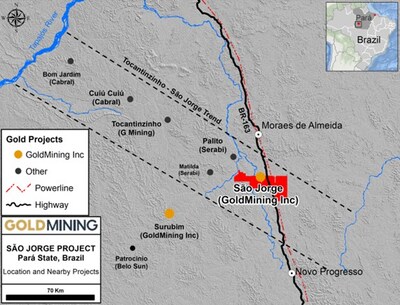GoldMining Intersects 37 Metres Grading 2.26 g/t Gold Within Mineralized Corridor of 163 Metres Grading 1.02 g/t Gold at the São Jorge Project, Brazil
Rhea-AI Summary
GoldMining has announced positive assay results from the first drill hole of its São Jorge Project in Brazil. The drilling program aims to confirm high-grade mineralization and improve resource estimates. Highlights include a 163m interval grading 1.02 g/t gold, with notable intersections of 37m at 2.26 g/t gold and 20m at 1.37 g/t gold. The project is strategically located in the Tapajós Gold District, near existing infrastructure. The results are expected to enhance the geological model and future resource estimations.
Positive
- 163m interval grading 1.02 g/t gold, including high-grade intersections.
- Strategic location in the Tapajós Gold District with good infrastructure.
- Positive initial results could enhance confidence in future resource estimates.
- Additional drilling programs underway to further validate initial findings.
Negative
- Only first drill hole results reported; future results pending.
- Potential risks in geological interpretations and resource estimations.
News Market Reaction 1 Alert
On the day this news was published, GLDG gained 0.41%, reflecting a mild positive market reaction.
Data tracked by StockTitan Argus on the day of publication.
The program consists of approximately 1,000 metres ("m") of total proposed diamond core drilling and 3,000 m of power auger drilling. The objectives of the program include, among other things, to complete confirmatory drilling within and near the margins of the existing São Jorge gold deposit1 (the "Deposit"), and test a reinterpretation of the structural controls on high-grade mineralization. Assay results for the first diamond drill hole have been received and are reported in this release.
Drill Hole SJD-120-24 highlights include:
- 163 m at 1.02 grams per tonne (g/t) gold (Au) from 44 m downhole depth, including higher-grade intersections:
- 20 m at 1.37 g/t Au from 44 m depth;
- 37 m at 2.26 g/t Au from 95 m depth;
- 11 m at 1.00 g/t Au from 148 m depth;
- 13 m at 1.35 g/t Au from 166 m depth; and
- 12 m at 1.15 g/t Au from 195 m depth.
Tim Smith, Vice President of Exploration, commented: "We are pleased to announce the results from the first drilling at São Jorge in more than a decade. The results from this first drill hole are strong and we believe help demonstrate an extensive corridor of mineralization consisting of multiple intercepts of broad gold mineralization. These include some narrower higher-grade zones. Oriented diamond core drilling has successfully confirmed our thesis for the structural controls on mineralization within the deposit, which was the first objective of our multi-pronged drilling program. We expect that the improved geological model based on these intercepts will provide greater confidence in future mineral resource estimation. Additionally, we have commenced the auger drilling component of the program and forward to providing additional updates."
Drill Program Details and Geological Description
São Jorge sits within the active and rapidly developing Tapajós Gold District (see Figure 1), which is estimated to have produced over 20 million ounces of gold historically from artisanal mining of surface deposits, according to the Brazil National Mining Agency. The Tapajós is home to Serabi Gold Plc.'s producing high-grade underground Palito Mine and G Mining Ventures Corp.'s ("G Mining") brand new Tocantinzinho open pit mine, which recently commenced commissioning of its ore processing facility (see G Mining news release June 11, 2024).
São Jorge is located immediately adjacent to paved Hwy BR-163 and a new 138 kV powerline corridor tied into the district electrical grid recently constructed for Tocantinzinho. Exploration activities at São Jorge are operated from a permanent camp adjacent to the existing Deposit and just 3 kilometres from the highway.
The Company commenced drilling at São Jorge in May 2024 (see news release dated May 29, 2024). Structural analysis of historic mapping and oriented core from drilling by previous operators identified two principal vein/fracture orientations, the intersection of which produces a steeply plunging high-grade 'shoot' geometry. To test this interpretation, three infill (confirmatory) oriented core drill holes are planned within the known Deposit and near its margins (see Figure 2). This drilling, including results of the first hole contained in this news release could provide evidence for a better understanding of the controls on high-grade mineralization and optimization of the resource modelling methodology.
SJD-120-24 intersected numerous zones of gold mineralization starting in the saprolite zone near the surface and extending into bedrock (see Figure 3). Mineralization comprises fracture-controlled sulphide ± quartz veins, with the sulphides consisting of dominant pyrite with lesser chalcopyrite, along metre-scale northwest-southeast striking shear zones hosted within monzogranite and along a sheared footwall contact between monzogranite and syenogranite, which cumulatively defines the São Jorge high-strain corridor. Pyrite occurs as hairline stringers, disseminated grains and semi-massive pyrite in 3 – 5 cm thick veins. Better gold grades are related to a higher abundance of sulphide minerals, particularly thicker veins, and/or a higher density of semi-massive to massive pyrite veins. Figure 4 illustrates the strong visual nature of mineralization at São Jorge.
1 Additional information regarding the São Jorge Project, including existing resource estimates and historical work at the project, is set out in the technical report titled "São Jorge Gold Project, Pará State, |
Table 1 – São Jorge assay intercepts from the first hole of the program received as of June 18, 2024.
Hole Number | Interval From | Interval To | Core Length1 | Au Grade (g/t) |
SJD-120-24 | 44.00 | 207.00 | 163.00 | 1.02 |
SJD-120-24 | 44.00 | 64.00 | 20.00 | 1.37 |
Including | 45.00 | 50.00 | 5.00 | 2.82 |
Including | 45.00 | 46.00 | 1.00 | 7.25 |
SJD-120-24 | 69.00 | 70.00 | 1.00 | 3.03 |
SJD-120-24 | 74.00 | 75.00 | 1.00 | 5.05 |
SJD-120-24 | 95.00 | 132.00 | 37.00 | 2.26 |
Including | 97.00 | 98.00 | 1.00 | 11.47 |
Including | 102.00 | 104.00 | 2.00 | 12.22 |
SJD-120-24 | 148.00 | 159.00 | 11.00 | 1.00 |
Including | 152.00 | 155.00 | 3.00 | 2.31 |
SJD-120-24 | 166.00 | 179.00 | 13.00 | 1.35 |
SJD-120-24 | 195.0 | 207.0 | 12.00 | 1.15 |
including | 201.00 | 206.00 | 5.00 | 2.24 |
Including | 205.00 | 206.00 | 1.00 | 7.29 |
SJD-120-24 | 249.00 | 250.00 | 1.00 | 1.07 |
SJD-120-24 | 259.00 | 260.00 | 1.00 | 1.27 |
SJD-120-24 | 265.00 | 266.00 | 1.00 | 3.74 |
Notes: | |
1. | True widths are estimated to be approximately |
Table 2 – São Jorge 2024 drill hole collar location coordinates.
Hole | Easting Metres | Northing | Elevation | Depth | Azimuth (Degrees) | Dip | Status |
SJD 120-24 | 657535 | 9282655 | 209.45 | 271.84 | 335 | -50 | All assays |
SJD 121-24 | Pending | ||||||
SJD 122-24 | Pending |
Qualified Person
Paulo Pereira, P. Geo., President of GoldMining, has supervised the preparation of, and verified and approved, the scientific and technical information herein this news release. Mr. Pereira is a Qualified Person as defined in National Instrument 43-101 – Standards of Disclosure for Mineral Projects ("NI 43-101").
Data Verification
For this drill core sampling program, samples were taken from the NQ/HQ core by sawing the drill core in half, with one-half sent to SGS Geosol Laboratórios Ltda. ("SGS") in
About GoldMining Inc.
GoldMining Inc. is a public mineral exploration company focused on acquiring and developing gold assets in the
Notice to Readers
Technical disclosure regarding São Jorge has been prepared by the Company in accordance with NI 43-101. NI 43-101 is a rule of the Canadian Securities Administrators which establishes standards for all public disclosure an issuer makes of scientific and technical information concerning mineral projects. These standards differ from the requirements of the
Cautionary Statement on Forward-looking Statements
Certain of the information contained in this news release constitutes "forward-looking information" and "forward-looking statements" within the meaning of applicable Canadian and
![]() View original content to download multimedia:https://www.prnewswire.com/news-releases/goldmining-intersects-37-metres-grading-2-26-gt-gold-within-mineralized-corridor-of-163-metres-grading-1-02-gt-gold-at-the-sao-jorge-project-brazil-302174885.html
View original content to download multimedia:https://www.prnewswire.com/news-releases/goldmining-intersects-37-metres-grading-2-26-gt-gold-within-mineralized-corridor-of-163-metres-grading-1-02-gt-gold-at-the-sao-jorge-project-brazil-302174885.html
SOURCE GoldMining Inc.













